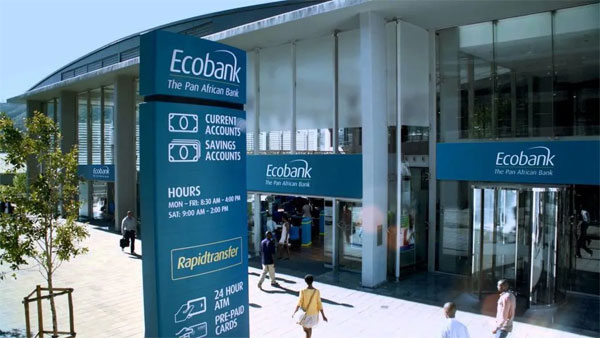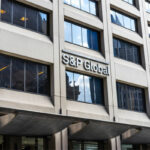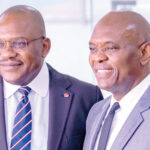ECOBANK Nigeria Ltd’s high share of foreign currency loans and problem loans is compounded by the weakening Nigerian naira and a shortage of U.S. dollars in Nigeria, says Standard and Poors (S&P).
Further potential depreciation of the naira could undermine the bank’s regulatory capital adequacy ratio (CAR), given its thin capital buffers.
Therefore, “we revised the outlook to negative from stable and affirmed our ‘B-/B’ ratings on Ecobank Nigeria,” it stated.
It said the negative outlook on Ecobank Nigeria reflects its view that the bank could breach its regulatory minimum capital requirements because of the material share of problem loans and low provisioning in the context of a weakening naira and thin capital buffers.
S&P also affirmed its ‘B-/B’ long- and short-term issuer credit ratings on the bank.
“A higher level of problem loans will likely result in higher provisions for Ecobank Nigeria. Pressures on the Nigerian naira exchange rate are persisting, following a sharp depreciation to N780/$1 in June 2023.
“Almost one-third of Ecobank Nigeria’s loans are classified as stage 2, which may lead to a further increase in provisions due to the weakening naira,” it stated.
These loans largely stem from and depend on the performance of Nigeria’s oil and gas sector, which has been underperforming. Therefore, S&P does not expect them to be resolved quickly.
In addition, the high level of foreign currency loans — at 65 percent compared to a 55 percent estimate for the sector, following naira depreciation in June 2023–poses additional credit risks in Nigeria due to the scarcity of U.S. dollars.
It added that foreign exchange (FX) shortages will continue to weigh on key sectors of the economy through 2024, despite the Central Bank of Nigeria (CBN)’s efforts to clear the FX backlog.
“Because of the weaker naira, we expect the bank to adjust the level of collateral on its letters of credit. The bank increased its provisions 166 percent in third-quarter 2023 from third-quarter 2022 with a cost of risk ratio of 1.8 percent.
“At the same time its nonperforming loans ratio increased to 8.7 percent of total loans as of September 30, 2023, from 6.9 percent as of Dec. 31, 2022, mainly fueled by depreciation of the naira, while the coverage ratio decreased to 56 percent as of September 30, 2023,” S&P latest report read in part.
Ecobank Nigeria’s thin capital buffers leave the bank at risk of breaching its minimum regulatory requirement, despite its positive net open position. Ecobank Nigeria’s profit before tax increased 24.0 percent as of September 30, 2023, from September 30, 2022.
As a result, the bank’s Capital Adequacy Ratio (CAR) stood at 11.4 percent relative to a regulatory minimum of 10.0 percent.
“Although we expect the bank to meet its capital requirements, albeit with very thin capital buffers, a potential sharp depreciation of the naira could undermine its regulatory CAR.
“While the naira trades closer to a managed-float rather than being a fully free-floating currency, the exchange rate is now significantly more in line with market demand — at about N850-N950 per $1 — and supply fundamentals, which remain weak.
“Despite the forbearance on single obligor limits by the CBN, and the higher earnings from revaluation gains, additional provisions will curb earnings and internal capital generation. The increase in foreign currency loans in naira terms will lead to an increase in risk-weighted assets, which will negatively affect the bank’s CAR,” it said.
The agency said it understands that if the minimum CAR were breached, the bank would have 30 days to restore its capital buffer. If it was not restored, this would trigger acceleration of payments on the outstanding Eurobonds, amounting to $300 million.
It believes that such an event could materially increase pressure on the bank’s FX liquidity position.
According to the agency, ‘B-/B’ ratings on Ecobank Nigeria reflect its core status to the Ecobank group.
This reflects the bank’s integral role in its parent’s future strategy. S&P derives its rating on the bank from ‘b’ group credit profile on the Ecobank group.
However, “we do not rate banks in Nigeria above the sovereign foreign currency rating because of the likely negative effect sovereign distress would have on their operations, including their ability to service foreign currency obligations. Therefore, the long-term rating on the bank is one notch lower at ‘B-’.
“The negative outlook on Ecobank Nigeria reflects our view that there is a one in three chance the bank could breach its regulatory minimum capital requirements because of the material share of problem loans and low provisioning in the context of a weakening naira and thin capital buffers.
“We would take a negative rating action over the next 12 months if the bank breached its minimum CAR due to higher credit losses than we forecast, and if U.S.-dollar-denominated contingent sources of funding and liquidity were hindered amid FX shortages in Nigeria. We would also lower our rating on Ecobank Nigeria if we take a negative rating action on Nigeria.
“We would revise the outlook on Ecobank Nigeria to stable over the next 12 months if the bank’s capitalisation improves, and its regulatory capital buffers increase, all else being equal,” S&P stated.
YOU SHOULD NOT MISS THESE HEADLINES FROM NIGERIAN TRIBUNE
FULL LIST: 45 visa-free countries Nigerian passport can travel in 2024
Nigeria sits behind Ghana, Guinea, Kenya, Lesotho, Morocco, Benin Republic and Namibia which are at…
How my brother and I became professor same day in same varsity —UNILORIN don
Recently, two brothers –Ahmed Oloduowo Ameen and Mubarak Oloduowo Ameen– were promoted to…
‘I expected N2,000 as my share from sale of human head we got at Saki cemetery’
Thirty-two-year-old Alli and Abdullahi, aged 35, who were the two suspects arrested by…
Why Port Harcourt refinery is yet to start production—Soneye, NNPCL Chief Comm Officer
Mr Femi Soneye is the Chief Corporate Communications Officer (CCCO) of the…
Fear women, fair women and Minister Ojo
Betta Edu, Sadiya Umar-Farouq and Halima Shehu are the reigning women in our…
What you should know about players in Nigerian 2024 AFCON team
The Nigerian football team have appeared in the finals of the Africa Cup of Nations on twenty different occasions. Nigeria has…






